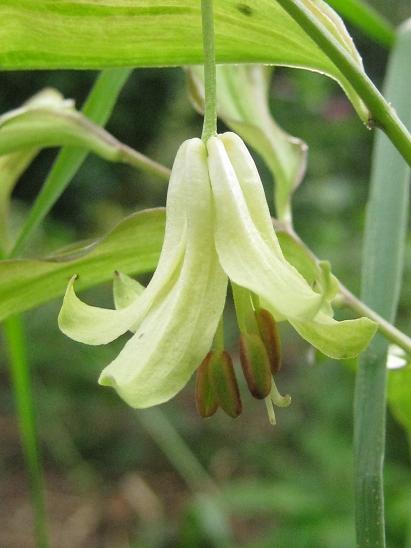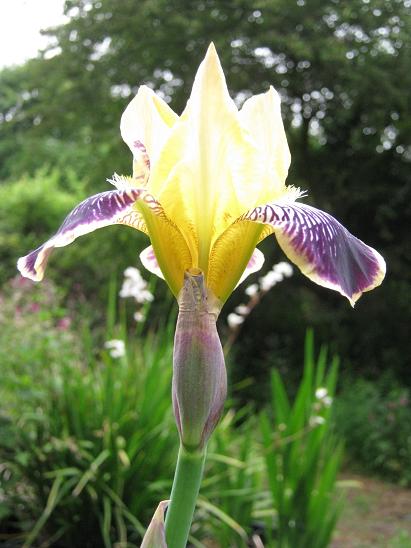JEARRARD'S HERBAL
Thats enough introduction - on with the plants!
To navigate this site, use the links above, or the detailed links at the bottom of this page.
... out in the garden.
10th June 2012

Clivia caulescens
I have been a little worried that we might be looking at a hot dry summer. I know would be lovely for the holidays and all the rest of it, but watering is a rather boring occupation.
I hadn't got as far as expressing it out loud but you have to be careful what you wish for. The week has seen enough rain to keep the garden going for a bit. Fortunately
I was paying attention to my favourite lottery programme (BBC weather) and got some more things planted out before the rain came.
In the greenhouse, the Clivia are starting to grow again after the shock of winter. They seem to be coping with the shock of a cold greenhouse after the relative
luxury of the conservatory. From time to time I lose something but there are so many seedlings coming along that any space is soon filled. Large plants in large pots
seem to be quite tough, and the small seedlings in tiny pots survive well. It is the middle sized plants that seem to have suffered most.
This Clivia caulescens is a large plant that came through the winter without damage and has produced a large umbel of flowers. The species comes from damp mountain forests
in Mpumalanga and Swaziland and is said to experience snow on occasion (though not sustained frost).
10th June 2012
 Crinodendron hookerianum
Crinodendron hookerianum
I have no idea why I don't grow more Crinodendron hookerianum, it is the perfect evergreen. It is tolerant of wind and growing conditions, it makes a good dense evergreen
and produces astonishing flowers in summer. I have a windbreak that needs thickening up and this is a prime candidate.
Introduced by William Lobb (who was a local boy) in 1848 from Chile. For years I have wanted some variation in the flower colour. I'm not sure why, because I can't imagine anything more perfect
than this bright scarlet but I like some variation. I am entranced by the recently introduced pale pink form, 'Ada Hoffman', but it has been rather feeble here and not really worth the trouble it takes to grow it.
It can be rather straggly in growth but it fills out enthusiastically if the leading shoot is cut out. I expect it could be trimmed into a passable hedge but the buds are produced in late autumn and do not develop until May,
so they are on the tips of the shoots for nearly 6 months before they develop. It would be easy to trim them off and they would be a significant loss.
10th June 2012

Disporum cantoniense 'Aureovariegatum'
Disporum cantoniense is a variable species. The flowers can be white, pale green or a rather muddy red-purple. This one has a beautiful greenish-white flower with widely flaring petals
(some of the reddish ones have almost tubular flowers).
This form has leaves with a lime green variegation in the centre of the leaf which makes a significant mark on the garden in the summer but at the moment the new leaves are still quite fresh and pale
and it is the flowers that attract attention.
This cultivar has been recently introduced from China under a variety of names. It struggled in a large pot here for a number of years before I got around to planting it out and it is now
growing taller than I have previously seen it under the trees in the woodland border. In a kind winter in the greenhouse it was almost evergreen but in its new position the autumn winds catch it and it dies back to ground level.
10th June 2012

Iris 'Nibelungen'
Herbaceous plants are always something of a challenge in the garden. The herbaceous weeds that are their main competitor in the border delight in the rich soil and moisture. In a drier or colder cliimate
I could rely on the weeds becoming dormant in the winter for long enough to get in and control them, but here the stinging nettles and brambles grow all your round and rapidly take over.
The new herbacous border was designed to minimise competition from invading perennial weeds. It isn't working perfectly, but it is working well enough to allow me to grow some classic plants of the herbaceous border
that I had otherwise given up on. Some success with peonies last year persuaded me to have another try at bearded Iris and this has been the result. I planted this about three months ago, so it is too early to claim
long term success, but these are the first bearded Iris flowers I have grown in the last 20 years and I am happy.
The plant is growing vigorously and if it doesn't rot in the rain, get eaten by a slug or swamped by stinging nettles them I should have a good clump for next year. The yellow and purple veined flower
was a pleasant surprise - I bought it because it looked vigorous and was cheap enough to overlook if it died. If it is still prospering next year I will be on the look out for a classic blue
and some other colours. The leaves are a good contrast with the yellow-green tangle of the Hemerocallis foliage and the flowers come at the beginning of the season to kick start the herbaceous display.
Latest Update:Camellia sasangua 'Variegata'
To find particular groups of plants I grow, click on the genus name in the table above. Click on the "Index" box at the top of the page for the full list.
I have a lot of good intentions when it comes to updating this site, and I try to keep a note
about what is going on, if you are interested.
If you want to contact me, the address is infoMONKEYjohnjearrard.co.uk
When typing the address in, please replace MONKEY with the more traditional @ symbol! I apologise for the tiresome performance involved, but I am getting too much
spam from automated systems as a result of having an address on the front page.

 Crinodendron hookerianum
Crinodendron hookerianum 
